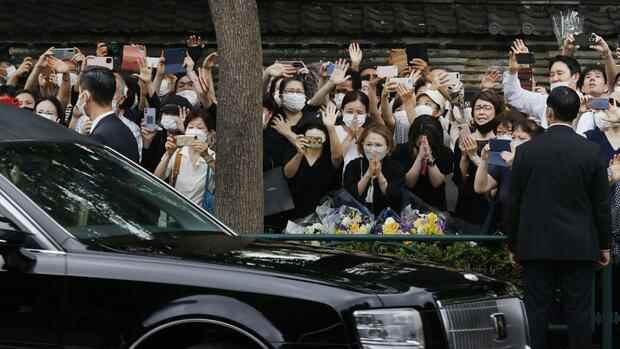Tokyo A photograph of Shinzo Abe is displayed in the white tent at the Zozo Temple. He laughs at it, wears a white shirt. The picture is framed by white floral arrangements. “Shinzo, thank you very much!” someone calls out. The funeral service for the murdered former Prime Minister Shinzo Abe will take place in the large complex in central Tokyo on Tuesday morning.
It is reserved for family and friends, but for the rest of the people there is a shrine on the other side of the temple. There was a line several hundred meters long.
Girls in cosplay costumes, boys in their school uniforms, employees on their lunch breaks, men and women in mourning clothes – Japanese people of all walks of life and ages line up.
They want to say goodbye to the politician who has ruled Japan longer than any other prime minister. Many weep quietly as they lay flowers and pray for Abe. “He was a great politician,” says an older worker, wearing a black T-shirt with beige work pants. “We are shocked.”
The word describes the mental state of Japan only insufficiently. America expert Yoshio Hotta compares the assassination with one of the greatest traumas in recent US history: “For me, this is on a par with the assassination of US President John F. Kennedy.” The political left and center are always skeptical remained opposite the national conservative Abe. “But most feel sadness because he was an important politician.”
Top jobs of the day
Find the best jobs now and
be notified by email.
The horror is particularly great in Abe’s circles. Politician Sanae Takaichi, who put Abe in the running for the presidency of the Liberal Democratic Party against current Prime Minister Fumio Kishida, tweeted Tuesday after the memorial service: “Since last Friday’s incident I have hardly slept, vomited food and been in a state mental and physical weakness that I had not experienced even when my parents died.”
Is Japan now facing a wave of violence?
Japan is shaken and deeply unsettled. The rampant national debt is causing concern for many, and the spreading global recession is frightening. In addition, old geopolitical certainties are dissolving. And now this assassination.
>> Read also: Assassination attempt on Shinzo Abe – The architect of the new Japan is dead
Quite a few Japanese are afraid of an end to the Pax Japonica, the social peace in the country. Kyoko Fukuhara, an employee of a large company, said, “I’m less shocked than surprised. I could never have imagined something like this happening in Japan.”
After all, the country has one of the strictest gun laws and therefore hardly any shootings. “I’m worried that there will be a rift in society and that the country could become less secure,” says the young woman.
In fact, dark scenes from Japan’s history come to mind for many Japanese people these days. Five current and former heads of government were assassinated in the 1920s and 1930s.
In the 1960s, too, emotions were still rife in politics. An ultranationalist assassinated the leader of the Socialist Party with a sword in 1960. As a reaction to the security alliance with the USA, violent demonstrations and acts of terrorism by the extreme left erupted a short time later.
However, Koichi Nakano, who is very familiar with the history of Japan as a political scientist at Tokyo’s Sophia University, sees no continuity. In recent decades there has been almost no violence against politicians. “And if they did, it was based on the extreme right or yakuza gangsters,” says Nakano, who, as a leftist, had often criticized the national conservative politician Abe. “I had a hard time believing the news of the assassination.”
The crime was made even more unbelievable by its motive: the assassin Tetsuya Yamagami was irreproachable and politically did not object to Abe. Instead, he wanted revenge on the Moon sect, which he accused of ruining his family by accepting large donations.
He then targeted Abe because the politician had ties to organizations within the sect. For months he made guns and explosive devices at home, tested them and then shot Abe during a campaign speech in the city of Nara.
Many Japanese continue to believe in the power of peace in Japan
However, Nakano does not believe that the deadly shots will become a beacon of a new wave of violence. “I think that the murder is an exception,” says the political scientist, despite the increasing division in society into rich and poor. “Japan is still an overall peaceful and orderly society.”
The funeral service took place in the closest family circle, but thousands of people took part on site.
(Photo: Bloomberg)
A 53-year-old accountant from a family business agrees with the professor in her grief. She just wants to be called Tomoko, without giving her family name. She knew of Abe’s scandals, which the left denounced so vehemently. She also knew that the left wanted to take him to court for it. “But politicians are often not completely clean,” she says. “For me he was okay.”
Tomoko was all the more appalled by the new quality of violence. “Typically in Japan, attacks are carried out with knives or arson,” she says. “But the act will not change Japan. Now everyone will be extra careful.”
US expert Hotta, who worked as a journalist in the US for a long time, agrees. “The energy of action will work in opposite directions,” he expects. Something sad happened, now society will try even harder to rule out such a drama in the future.
According to Hotta, widespread social rules about not disturbing and hurting others continue to be at the top of the value scale in Japan. “It’s like a self-correcting system in our heads.”
More: Japan’s coalition celebrates election victory in the shadow of the Abe assassination
